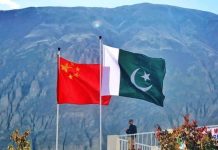DM Monitoring
BEIJING: Forging a strong sense of community for the Chinese nation must be the focus of the Party’s work on ethnic affairs in the new era, President Xi Jinping said at a recently-concluded key meeting on ethnic affairs.
Acting upon the guiding principle put forth by Xi, also general secretary of the Communist Party of China (CPC) Central Committee and chairman of the Central Military Commission, people of all ethnic groups are working to boost ethnic unity, in the pursuit of a modern socialist country for China.
Work related to ethnic affairs has always been a matter of significance for China, a vast and populous country consisting of 56 ethnic groups. The sense of community for the Chinese nation was first put forward by Xi at the second central work conference on Xinjiang in May 2014. At a central conference on ethnic affairs held later in the same year, Xi once again highlighted the importance of laying a solid foundation for the sense of community for the Chinese nation.
The idea was enshrined in the Party’s Constitution at the 19th CPC National Congress in October 2017. At the central conference on ethnic affairs last week, Xi once again emphasized this point.
Liu Xinjian, an official in Hami, northwest China’s Xinjiang Uygur Autonomous Region, considered making the sense of community a matter of utmost significance. From his perspective, it helps to motivate all ethnic groups to strive for the further development and progress of the Chinese nation. Ma Guoqing, a professor at Minzu University of China in Beijing, said Xi’s latest speech is significant in terms of both ideology and theory.
“It represents the latest achievement in adapting Marxist theory on ethnic affairs to the Chinese context,” Ma said. Xi stressed that guiding all ethnic groups to jointly strive for fully building a modern socialist country must be taken as a crucial task of the CPC’s ethnic work in the new era. China in February announced that it has eradicated absolute poverty. Continuous efforts are being made to enhance the sense of fulfillment, happiness, and security among people of various ethnic groups.
Shi Yongjun, a government official in the Tibet Autonomous Region, learned from his work experience that the focus of forging a strong sense of community for the Chinese nation could start from further improving people’s livelihoods. The case of Tibet is a prime example of how national unity has boosted local development. Home to 45 ethnic groups including Tibetan, Hui and Menba, the region has witnessed huge changes over the past 70 years since its peaceful liberation.
The regional GDP ballooned from 129 million yuan (about 19.9 million U.S. dollars) in 1951 to 190 billion yuan in 2020; all registered poor residents and counties had shaken off poverty by the end of 2019, meaning that the region escaped absolute poverty for the first time in history. “Tibet could never have attained such achievements without ethnic unity,” Losang Jamcan, director of the Standing Committee of the Tibet Autonomous Regional People’s Congress, once said. “Tibet’s development over the past 70 years has offered convincing evidence that solidarity and stability bring prosperity.”
Identifying with the culture is the foundation for ethnic unity, Xi noted when joining deliberations with lawmakers from north China’s Inner Mongolia Autonomous Region during the annual meeting of the National People’s Congress in March.






